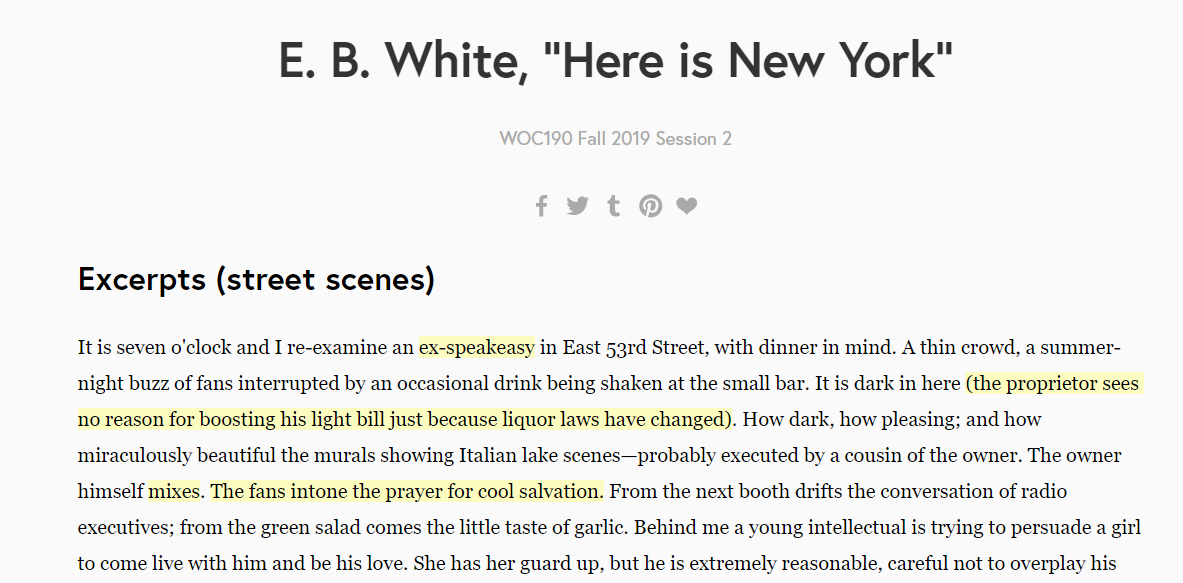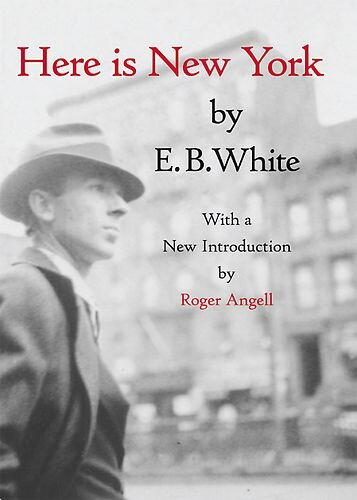E. B. White, "Here is New York"
Annotated version
Read the full text
Excerpts (street scenes)
It is seven o'clock and I re-examine an ex-speakeasy in East 53rd Street, with dinner in mind. A thin crowd, a summer-night buzz of fans interrupted by an occasional drink being shaken at the small bar. It is dark in here (the proprietor sees no reason for boosting his light bill just because liquor laws have changed). How dark, how pleasing; and how miraculously beautiful the murals showing Italian lake scenes—probably executed by a cousin of the owner. The owner himself mixes. The fans intone the prayer for cool salvation. From the next booth drifts the conversation of radio executives; from the green salad comes the little taste of garlic. Behind me a young intellectual is trying to persuade a girl to come live with him and be his love. She has her guard up, but he is extremely reasonable, careful not to overplay his hand. A combination of intellectual companionship and sexuality is what they have to offer each other, he feels. In the mirror over the bar I can see the ritual of the second drink. Then he has to go to the men's room and she has to go to the ladies’ room, and when they return, the argument has lost its tone. And the fan takes over again, and the heat and the relaxed air and the memory of so many good little dinners in so many good little illegal places, with the theme of love, the sound of ventilation, the brief medicinal illusion of gin.
[…]
Another hot night I stop off at the Goldman Band concert in the Mall in Central Park. The people seated on the benches fanned out in front of the band shell are attentive, appreciative. In the trees the night wind stirs, bring ing the leaves to life, endowing them with speech; the electric lights illuminate the green branches from the underside, translating them into a new language. Overhead a plane passes dreamily, its running lights winking. On the bench directly in front of me, a boy sits with his arm around his girl; they are proud of each other and are swathed in music. The cornetist steps forward for a solo, begins, “Drink to me only with thine eyes…” In the wide, warm night the horn is startlingly pure and magical. Then from the North River another horn solo begins—the Queen Mary announcing her intentions. She is not on key; she is a half tone off. The trumpeter in the bandstand never flinches. The horns quarrel savagely, but no one minds having the intimation of travel injected into the pledge of love. “I leave,’ sobs Mary. “And I will pledge with mine,” sighs the trumpeter. Along the asphalt paths strollers pass to and fro; they behave considerately, respecting the musical atmosphere. Popsicles are moving well. In the warm grass beyond the fence, forms wriggle in the shadows, and the skirts of the girls approaching on the Mall are ballooned by the breeze, and their bare shoulders catch the lamplight. “Drink to me only with thine eyes.” It is a magical occasion, and it's all free.
[…]
Walk the Bowery under the El at night and all you feel is a sort of cold guilt. Touched for a dime, you try to drop the coin and not touch the hand, because the hand is dirty; you try to avoid the glance, because the glance accuses. This is not so much personal menace as universal—the cold menace of unresolved human suffering and poverty and the advanced stages of the disease alcoholism. On a summer night the drunks sleep in the open. The sidewalk is a free bed, and there are no lice. Pedestrians step along and over and around the still forms as though walking on a battlefield among the dead. In doorways, on the steps of the savings bank, the bums lie sleeping it off. Standing sentinel at each sleeper's head is the empty bottle from which he drained his release. Wedged in the crook of his arm is the paper bag containing his things. The glib barker on the sight-seeing bus tells his passengers that this is the “street of lost souls,” but the Bowery does not think of itself as lost; it meets its peculiar problem in its own way—plenty of gin mills, plenty of flop-houses, plenty of indifference, and always, at the end of the line, Bellevue.
A block or two east and the atmosphere changes sharply. In the slums are poverty and bad housing, but with them the reassuring sobriety and safety of family life. I head east along Rivington. All is cheerful and filthy and crowded. Small shops overflow onto the sidewalk, leaving only half the normal width for passers-by. In the candid light from unshaded bulbs gleam watermelons and lingerie. Families have fled the hot rooms upstairs and have found relief on the pavement. They sit on orange crates, smoking, relaxed, congenial. This is the nightly garden party of the vast Lower East Side—and on the whole they are more agreeable-looking hot-weather groups than some you see in bright canvas deck chairs on green lawns in country circumstances. It is folksy here with the smell of warm flesh and squashed fruit and fly bitten filth in the gutter, and cooking.
At the corner of Lewis, in the playground behind the wire fence, an open air dance is going on—some sort of neighborhood affair, probably designed to combat delinquency. Women push baby carriages in and out among the dancers, as though to exhibit what dancing leads to at last. Overhead, like banners decorating a cotillion hall, stream the pants and bras from the pulley lines. The music stops, and a beautiful Italian girl takes a brush from her handbag and stands under the street lamp brushing her long blue-black hair till it shines. The cop in the patrol car watches sullenly.




